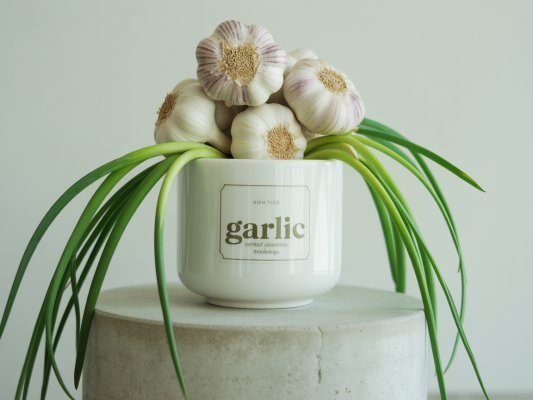
garlic
Description
Garlic (Allium sativum L.) is a globally recognized spice, originating from Central Asia, that humans have utilized for culinary and medicinal purposes for thousands of years, with documented use dating back to ancient Egypt. It works in your body and brain through its diverse bioactive sulfur compounds, like allicin and S-allyl-cysteine, and is most known for its potent antioxidant, anti-inflammatory, cardiovascular protective, and emerging neuroprotective effects. Numerous studies, including over a thousand in the last decade, indicate that garlic constituents can protect neuronal cells from damage, reduce cardiovascular risk factors linked to dementia, and may improve cognitive functions in certain experimental models.
Table of Contents
Categories & Effectiveness
Learn about our rating methodologyBrain Health
Brain Antioxidant Shield
7/10Strong evidence of effectiveness
Acetylcholine Support
5/10Moderate evidence of effectiveness
Brain Circulation Boost
4/10Moderate evidence of effectiveness
Neuro-Repair Support
2/10Limited evidence of effectiveness
Cognition
Memory & Recall
4/10Moderate evidence of effectiveness
Learning Speed
3/10Limited evidence of effectiveness
Physical Performance
Blood Sugar Support
6/10Moderate evidence of effectiveness
Fat Metabolism
5/10Moderate evidence of effectiveness
Systemic Health
Cholesterol Management
8/10Strong evidence of effectiveness
Systemic Antioxidant
8/10Strong evidence of effectiveness
Anti-Inflammatory (Systemic)
7/10Strong evidence of effectiveness
Liver Protection
7/10Strong evidence of effectiveness
Dosage & Side Effects
Recommended Dosage
- Key Dosage Tips:
- Start with a lower dose to assess tolerance.
- Consider enteric-coated supplements to minimize digestive upset.
- Consult a healthcare provider for personalized dosage advice, especially if you have underlying health conditions.
Potential Side Effects
Bioavailability & Half-Life
Interactions & Stacks
Recommended Products
Now Foods, Garlic Oil, 100 Softgels, 9mg oder 4500mg Knoblauch Knoblauchöl-Konzentrat je Dosis, Glutenfrei, Geschmacksneutral
- Rated 5.0 stars by 2 customers
- Premium quality ingredients
Now Foods, Garlic Oil (Knoblauchöl), 1.500mg, 250 Weichkapseln, Laborgeprüft, Pflanzlich, Glutenfrei, Ohne Gentechnik
- Rated 4.7 stars by 35 customers
- Premium quality ingredients
Healthspan Knoblauch | 1.200 mg | Unterstützt Herzgesundheit, Atmungssystem & Cholesterinspiegel | Zusätzlich Vitamin B1 | Geruchskontrolliert & Leicht zu Schlucken | Vegan | 120 Tabletten
- Rated 4.5 stars by 81 customers
- Special offer: 10 % Rabatt auf deine erste Abonnement-Bestellung
As an Amazon Associate we earn from qualifying purchases. Prices and availability are accurate as of the date/time indicated and are subject to change.
Benefits by Use Case
Cardiovascular Support
Helps lower cholesterol and blood pressure, reducing the risk of heart disease. Effects are most pronounced with consistent, long-term use. However, effects can be modest.
User Review:
Taking garlic by mouth seems to reduce systolic blood pressure by about 7-9 mmHg and diastolic blood pressure by about 4-6 mmHg in people with high blood pressure.
Immune System Boost
May enhance immune cell function and reduce the severity of colds and flu. Allicin and other compounds exhibit antimicrobial and antiviral properties. Not effective against all pathogens.
User Review:
Supplementation with aged garlic extract improves both NK and gammadelta-T cell function and reduces the severity of cold and flu symptoms.
Antioxidant Protection
Helps neutralize free radicals and reduce oxidative stress, protecting cells from damage. Aged Garlic Extract (AGE) is particularly rich in antioxidant compounds, such as S-allylcysteine (SAC).
User Review:
AGE exerted its antioxidant action by scavenging reactive oxygen species and enhancing the cellular antioxidants like reduced glutathione (GSH), superoxide dismutase (SOD), catalase (CAT) and glutathione peroxidase (GPx) of vascular endothelial cells.
Liver Support
May improve liver health by reducing fat buildup and protecting against damage. Shows promise in managing nonalcoholic fatty liver disease (NAFLD).
User Review:
Taking garlic powder by mouth seems to help to improve liver health in people with NAFLD.
Mechanism of Action
- Cardiovascular Health: Garlic can inhibit cholesterol synthesis in the liver, reduce LDL cholesterol levels, and prevent LDL oxidation. It also promotes vasodilation by increasing nitric oxide production, leading to lower blood pressure.
- Immune Support: Garlic enhances the activity of immune cells like natural killer (NK) cells and T cells. Its antimicrobial properties help fight off bacterial, viral, and fungal infections.
- Antioxidant Effects: Garlic compounds scavenge free radicals, reducing oxidative stress and protecting cells from damage. They also modulate inflammatory pathways, reducing chronic inflammation.
Frequently Asked Questions
Where to Buy garlic
Based on quality, price, and customer reviews, here are our top recommended garlic supplements:
Knoblauch Weichkapseln - 15.000mg (500:1 Extrakt) - 180 vegane Kapseln - Allicin für 6 Monate - Kaltgepresster Knoblauchöl Extrakt in Softgels - Fermentiert & Geschmacksneutral - Von WeightWorld
- Rated 4.0 stars by 3,022 customers
- Special offer: Spare 5 % mit Rabattgutschein
Garcinia Cambogia Fruchtextrakt - 1000mg pro Kapsel - 60% Hydroxycitronensäure - 2 Monate Vorrat - 60 vegane Kapseln - Pure Garcinia Malabar Tamarind von WeightWorld
- Rated 4.1 stars by 1,101 customers
- Premium quality ingredients
Berberin Kapseln 1000 mg | Hochdosierter Extrakt 50:1 | Chrom + Schwarzem Knoblauch + Piperin | Vegan & Ohne Zusatzstoffe | Laborgeprüft | Deutsche Produktion von Vegavero®
- Rated 4.3 stars by 680 customers
- Premium quality ingredients
As an Amazon Associate we earn from qualifying purchases. Prices and availability are accurate as of the date/time indicated and are subject to change.
Summary & Expert Opinion
- Key Strengths: Well-researched for cardiovascular benefits, readily available in various forms, and generally safe for most.
- Key Weaknesses: Potential for drug interactions, digestive upset in some individuals, and limited evidence for direct cognitive enhancement in humans.
- Recommendation: Incorporate garlic into your diet for overall wellness, but exercise caution if you have bleeding disorders, are taking medications, or experience digestive issues.
Deeper Dive:
Garlic's beneficial effects are attributed to its complex array of organosulfur compounds. Allicin, formed from alliin by the enzyme alliinase when garlic is crushed, is a key player. However, allicin is unstable and quickly breaks down into other compounds like diallyl disulfide (DADS) and S-allylcysteine (SAC). These compounds interact with various biological pathways.
- Cardiovascular Mechanisms: Garlic's lipid-lowering effects involve inhibiting HMG-CoA reductase, a key enzyme in cholesterol synthesis. It also impacts platelet aggregation by inhibiting thromboxane formation and modulating calcium mobilization. Its vasodilatory effects are linked to nitric oxide (NO) production, which relaxes blood vessels.
- Immune Modulation: Garlic compounds modulate cytokine expression, influencing the balance between Th1 and Th2 lymphocytes. This may contribute to its immune-boosting effects. Aged Garlic Extract (AGE) has been shown to enhance natural killer (NK) cell activity, which is crucial for fighting infections.
- Antioxidant Actions: Garlic's antioxidant activity stems from its ability to scavenge reactive oxygen species (ROS) and enhance cellular antioxidant enzymes like superoxide dismutase (SOD), catalase (CAT), and glutathione peroxidase (GPx). It can also prevent LDL oxidation, a key step in atherosclerosis.
However, some studies show mixed results, and human clinical trials are needed to confirm these effects. For example, the precise mechanism of action for garlic's antihypertensive effects remains controversial. The inconsistent findings could be attributed to differences in garlic preparations, study designs, and participant characteristics.
`










